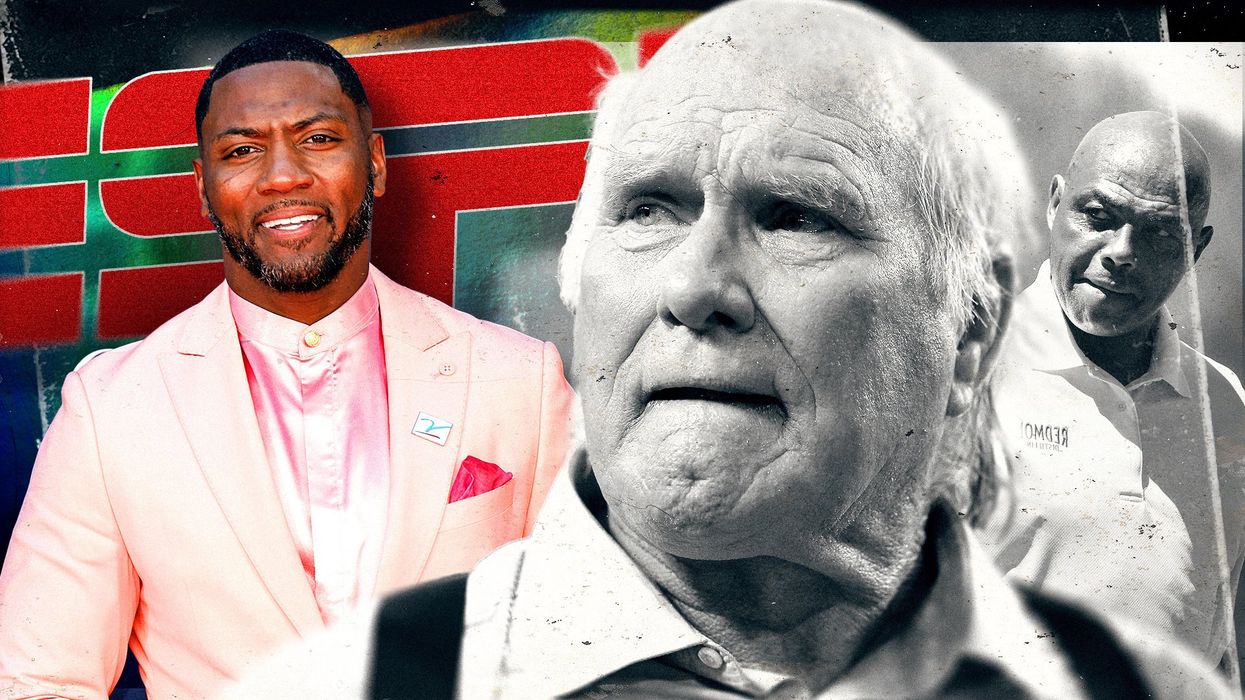
Frazer Harrison / Staff, Michael Reaves / Contributor, Isaiah Vazquez / Stringer | Getty Images

In 2012, Charles Barkley won his first Emmy Award for outstanding personality studio analyst. He won it again the next year. And two more times since then.
He launched his broadcasting career in 2000, right after ending his legendary NBA career. Almost instantly, Barkley rivaled football’s Terry Bradshaw as the greatest athlete turned broadcaster. Barkley matched Bradshaw’s irreverence and self-deprecation and surpassed the four-time Super Bowl winner in outspokenness and outrageousness.
There have been better and more famous basketball and football players than Barkley and Bradshaw, but none have been more relatable, more sought after to share a beer with for the typical sports fan.
This relatability made Barkley and Bradshaw the new gold standard for sports TV. They replaced Howard Cosell, an antagonistic journalist regarded as the greatest sports TV broadcaster. With Barkley and Bradshaw, television networks got Cosell’s pointed criticism from an inside-the-locker-room perspective.
Sports fans loved it. And television networks used to love pleasing sports fans. Now they don’t.
This past year, ESPN football analyst Ryan Clark won the Emmy for outstanding personality studio analyst. Clark was a solid NFL player for the Pittsburgh Steelers. He earned one Pro Bowl appearance and started on a Super Bowl-winning team.
As a broadcaster, he’s mediocre. He mostly regurgitates opinions he believes will be popular on social media. He once cried on air because his college-age son told him a white woman at a fast-food drive-thru addressed him with a racial slur.
Ryan Clark is not soft. He’s phony. He lacks the kind of authenticity that made Barkley and Bradshaw broadcasting superstars. Clark’s ascension in sports television speaks to social media’s corrosive impact on journalism and corporate media’s utter disdain for viewers.
This week, Clark found himself in a lightweight feud with Dolphins quarterback Tua Tagovailoa. Clark joked on air that Tagovailoa gained weight during the off-season and looked like a thick stripper at an infamous Atlanta strip club. Clark made the kind of irreverent, politically incorrect joke that made Barkley must-see TV.
Tagovailoa took offense and responded at a post-practice press conference, telling Clark to “keep my name out of your mouth.”
That should have been the end of it. But Clark spotted an opportunity to signal virtue and burnish his brand. Clark issued a public apology, tweeting: “When I decided to do TV I had two main priorities. 1. Respect all NFL players, coaches, executives and staff members. 2. Earn and keep the respect of those very same people.
“Those priorities are important to me, and when I miss that mark, I have to hold myself accountable. This game is difficult. Players sacrifice so much to be a part of that 1%. I have a responsibility to those players to be thoughtful in the way I present my opinions of them. In joking about Tua Tagovailoa, I didn’t meet that responsibility.”
I agree that Clark has failed to meet his responsibility. He’s failed sports fans. When Clark decided to work in sports television, his main priority should be earning and keeping the respect of sports fans, not his former peers.
ESPN’s motto and mission statement is simple: “Serving sports fans. Anytime. Anywhere.”
Clark thinks the mission is to pleasure multimillion-dollar jocks, any time, anywhere.
He’s not alone. Most members of the sports media believe the same thing Clark does. You can read the replies to Clark's apology and see countless members of the media praising it.
The American media rejects the responsibility of representing the 99%. Journalists, broadcasters, and pundits serve the elite.
It’s long past time for ESPN to change its mission statement. One of the network’s highest-profile employees stated in writing that he places zero importance on sports fans. I don’t blame Clark. His priorities reflect the unstated mission of his employer.
ESPN and its highest-paid talking heads hate sports fans.
Last year, Stephen A. Smith and the crew at “First Take” smeared BYU students and fans as racist because a Duke volleyball player claimed someone shouted the N-word at her. After a thorough investigation, it was made pretty clear that Rachel Richardson fabricated the incident.
Did Smith and company issue an apology to BYU or the autistic young man initially blamed? Of course not. Fans don’t matter. Only athletes matter. And black and brown athletes matter the most.
Ryan Clark symbolizes the pivot in mainstream media. The Barkley-Bradshaw-Cosell era is over. The media do not care about entertaining, informing, or representing the views of sports fans. That’s hard work that requires a level of courage men can no longer muster.
Ryan Clark talks about sports like he’s a thick stripper working a pole at Atlanta’s Onyx gentlemen’s club.
Jason Whitlock
BlazeTV Host